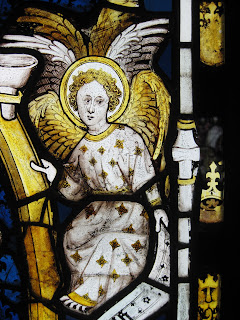How Michaelmas echoes throughout Autumn
Even as we celebrate Michaelmas, many parish churches in these Islands and in Canada will also be preparing to celebrate the Festival of Harvest Thanksgiving. Michaelmas brings to mind the ministry of the angels in the eschatological harvest: "The harvest is the end of the world. And the reapers are the angels" (Matthew 13:39). It points, in other words, to how Harvest Thanksgiving, while a joyous celebration of the order of creation, is also an icon of the order of redemption, reflected in the popular hymnody associated with Harvest: 'Then, the Church triumphant come, raise the song of harvest-home'.
While Thanksgiving in the United States falls in late November, here too Michaelmas is an anticipation of the eschatological imagery of Harvest and Autumn, not least because Advent is particularly close.
After early October Harvest Thanksgiving in these Islands and Canada, attention turns to All Hallows' Eve and All Saints' Day. These days have a profound relationship with Michaelmas. The spooky, gothic aspect of All Hallows' Eve (an important Christian recognition of darkness) not only looks forward to the light of the following day's feast: it also looks back to Michaelmas, to Saint Michael and all the angels who "by thy appointment ... succour and defend us on earth".
Likewise, as Michaelmas draws us to behold the "wonderful order" in which humanity shares with the angelic host, so it prepares us to celebrate All Saints' Day and discern the "one communion and fellowship" we share with "thy blessed Saints". As we enter into the dying months of the year, as we descend into the darker days and are confronted with the signs of the mortality of this passing order, Michaelmas and All Saints' Day are declarations of the vision glorious, of our participation in the Communion of Saints, our hope in the life everlasting.
When we reach mid-November, a sombre pall hangs over Autumn days. In these Islands and in Canada this is Remembrancetide. The reading for the Epistle on Michaelmas provides a stark reminder that Remembrancetide is close: "And there was war in heaven: Michael and his angels fought against the dragon". The memory of past conflicts haunts those November Days, and Michaelmas solemnly points to this: "Woe to the inhabiters of the earth, and of the sea: for the devil is come down unto you, having great wrath".
Angels look out from many a war memorial and many a stained glass window dedicated to the fallen. Their feast is celebrated in late September but mid-November also recollects their ministry in the midst of bitter death and anguish.
As mid-November becomes late November, so the season of Advent begins. (Advent Sunday this year is 27th November.) The Episcopalian Reformed theologian Fleming Rutledge has described Michaelmas as "The first turn toward Advent". The angels of Michaelmas are bearers of the Advent hope. We know "that in the last day, when he shall come again in his glorious Majesty, to judge both the quick and the dead", the angels will be present:
When the Son of man shall come in his glory, and all the holy angels with him, then shall he sit upon the throne of his glory (Matthew 25:31).
When Autumn ends and the days of Advent bring us to the darkest time of the year, as we pray "give us grace that we may cast away the works of darkness, and put upon us the armour of light", so the echoes of Michaelmas will continue to be heard, in anticipation of the day when the Lord "shall send his angels, and shall gather together his elect from the four winds" (Mark 13:27).
Michaelmas, then, echoes throughout Autumn, deepening our experience of Harvest; its light reflected in All Hallows'; a presence known in Remembrancetide; and leading us into Advent. Such is the richness of this feast: the words from Scripture and Prayer Book read on this day, and the hymnody and iconography associated with it, set before us themes that will resonate throughout Autumn's feasts and observances, until in the days of December we prepare ourselves to celebrate the time when 'The world in solemn stillness lay To hear the angels sing'.




Comments
Post a Comment